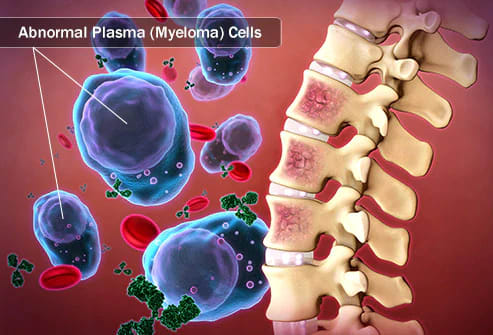Making CAR T-cell therapy last: Discovering mutations associated with antigen escape in multiple myeloma
Chimeric antigen receptor (CAR) T-cell immunotherapy is a promising cancer treatment, especially for hematological malignancies. However, many challenges remain in the development of this emerging class of therapeutics, from deepening responses in blood-based tumors to expanding efficacy in solid tumors. To face these challenges, understanding the mechanisms behind response, resistance, and toxicity to cell therapies is key. One particular type of resistance is antigen escape and downregulation, which have emerged as major issues impacting the durability of CAR T-cell therapy (1). In this post, we take a look at recent translational research (2) utilizing clinical trial data combined with single cell gene expression analysis of plasma cells to uncover the source of antigen escape in one patient being treated with CAR T-cell therapy for multiple myeloma.
.jpg)
Multiple myeloma (MM) is a cancer of plasma cells, which are a type of white blood cell that produces antibodies in response to an antigen. B-cell maturation antigen (BCMA), expressed by the TNFRSF17 gene, is a receptor on B cells that activates the cell to proliferate. Normally, B cells differentiate into plasma cells that produce antibodies to antigens, but in MM, these plasma cells become overactive, producing abnormal antibodies. Symptoms of MM are typically not felt right away, but as the cancer progresses, the disease can cause bone pain, anemia, kidney dysfunction, and immune dysfunction leading to infections.

BCMA is a viable target for treating MM using cancer immunotherapy, especially CAR T-cell therapy, for many reasons (3). Expression levels of BCMA are associated with progression of MM, making it a valuable biomarker, prognostic marker, and marker of treatment response (4, 5, 6). While BCMA is a membrane-bound protein, it can be cut by γ-secretase to become a soluble form that circulates in the blood and is elevated in patients with MM (4). Additionally, higher levels of serum BCMA (sBCMA) have been associated with poorer clinical outcomes, and patients who have responded to therapy have reduced sBCMA levels compared to patients with progressive disease (4). With such a poor survival rate (50% at five years)—and patients with relapsed/refractory MM having even shorter times—new treatments for multiple myeloma are desperately needed.
While several immunotherapies directed toward BCMA as a target are being investigated and used, one CAR T-cell therapy (Idecabtagene-vicleucel (ide-cel), or bb2121), was recently tested in a dose-escalating phase 1 clinical trial (7) and showed an overall response rate of 85%, with 45% of patients achieving complete response. However, some patients relapsed, developing a resistance to the CAR T-cell therapy in the form of antigen loss, where there is a decrease or loss of expression of the BCMA antigen. While this loss has been observed in other studies, scientists are still not sure what’s behind immune escape.
In a recent study, scientists led by Matteo C. Da Vià, PhD, then in the lab of Leo Rasche, PhD, at the University Hospital of Würzburg, Germany, wanted to understand how plasma cells lose the BCMA receptor, which causes the CAR T-cell therapy directed to this molecule to become ineffective. In a phase 2 clinical trial (8) testing the efficacy and safety of bb2121, patients were infused with their own T cells that had been engineered using viral vectors to express the receptor that recognizes and binds to BCMA. Dr. Da Vià and team looked at one patient in particular, a 71-year-old male, who had relapsed five months after a single CAR T-cell infusion.
Single cell analysis reveals genomic instability leading to antigen loss
To understand what was happening at the molecular level, the scientists used Chromium Single Cell Gene Expression to perform transcriptomic analysis on the patient’s bone marrow cells taken at baseline and relapse. They found that TNFRSF17 was strongly expressed at baseline but was nearly undetectable at progression. Because they saw that other plasma cell markers (CD38, for example) were still being expressed at progression, this told them that the CAR T-cell therapy was actually selecting clones that expressed BCMA. Looking further, they found that MM cells at progression were transcriptionally heterogeneous and that infiltrating T cells in the bone marrow showed increased expression of exhaustion markers at relapse compared to baseline.
To further understand how the gene for BCMA had been lost, they employed whole genome sequencing (WGS) of MM cells at progression to uncover multiple genomic changes: a large heterozygous deletion of 21.3 megabases (Mb) affecting chromosome 16 and a homozygous deletion of 91 kilobases (kb), which caused a biallelic loss of the TNFRSF17 gene at 16p13.13. This suggests that in this patient, loss of BCMA on plasma cells after CAR T-cell therapy and subsequent relapse is caused by acquired genomic mutations.
Given the discoveries above, heterozygous gene deletions that exist before CAR T-cell therapy might influence whether a patient develops resistance to the therapy. To learn more, Dr. Da Vià’s team combined scRNA-seq and WGS analysis to find that, while the patient did not have a heterozygous TNFRSF17 gene deletion at baseline, there was a gain that included the TNFRSF17 locus next to a deletion of 16p13.3–p13.2, suggesting a pre-existing “genomic instability” at that region.
Deciphering the mechanism behind antigen loss advances CAR T-cell therapy
While CAR T-cell therapies have shown great promise for solid tumors, there are still obstacles when it comes to treating blood cancers, including developing resistance to the treatment by way of antigen loss. Learning more about the mechanism behind immune escape—and in this case, copy number changes around the TNFRSF17 gene—will lead to improved CAR T-cell therapy design. For instance, scientists are working on engineering CAR T cells to be specific to more than one antigen, or made to need lower levels of antigen. As more studies use single cell techniques to reveal the dynamics of how CAR T cells interact with their target antigens, scientists will begin to lay the groundwork for improving the efficacy of these treatments.
References:
- Majzner RG & Mackall CL. Tumor antigen escape from CAR T-cell therapy. Cancer Discov 8(10): 1219–1226, 2018.
- Da Vià MC, et al. Homozygous BCMA gene deletion in response to anti-BCMA CAR T cells in a patient with multiple myeloma. Nat Med 27(4): 616–619, 2021.
- Shah N, et al. B-cell maturation antigen (BCMA) in multiple myeloma: rationale for targeting and current therapeutic approaches. Leukemia 34(4): 985–1005, 2020.
- Rasche L, et al. Spatial genomic heterogeneity in multiple myeloma revealed by multi-region sequencing. Nat Commun 8(1): 268, 2017.
- Rustad EH, et al. Revealing the impact of structural variants in multiple myeloma. Blood Cancer Discov 1(3): 258–273, 2020.
- de Larrea CF, et al. Defining an optimal dual-targeted CAR T-cell therapy approach simultaneously targeting BCMA and GPRC5D to prevent BCMA escape-driven relapse in multiple myeloma. Blood Cancer Discov 1(2): 146–154, 2020.
- Raje N, et al. Anti-BCMA CAR T-cell therapy bb2121 in relapsed or refractory multiple myeloma. N Engl J Med 380(18): 1726–1737, 2019. https://clinicaltrials.gov/ct2/show/NCT02658929
- Hege K. (2017, Dec - ). A Phase 2, Multicenter Study to Determine the Efficacy and Safety of bb2121 in Subjects With Relapsed and Refractory Multiple Myeloma. https://clinicaltrials.gov/ct2/show/NCT03361748
